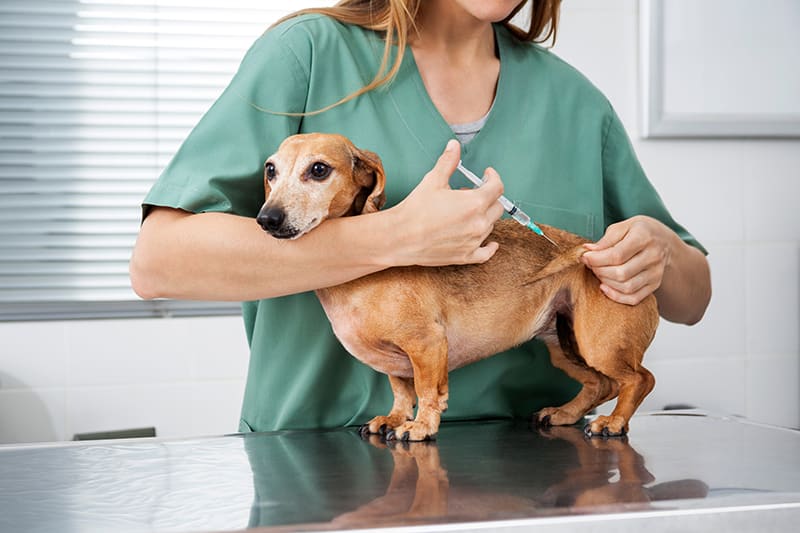Why Get Your Dog Vaccinated
Like vaccines for people, dog vaccines protect your pet against a host of serious diseases that could threaten the life of your pet.
While getting your dog vaccinated may seem like an unnecessary expense at the time, your dog's shots are likely to save you much more money when compared to the cost of treatment for the illnesses vaccines protect against.
Which Vaccines Are Right For Your Dog
In the Huntersville area, the vaccinations recommended for dogs include immunizations to help prevent bordetella, distemper, parvovirus, hepatitis, and rabies.
At LakeCross Veterinary Hospital our vets will be able to recommend the vaccines which are most appropriate for your dog based on your dog's age, where you live, and your dog's lifestyle.
Vaccination Schedule for Puppies & Adult Dogs
Puppy Shot Schedule
6 - 8 Weeks
- *DHPP Shot 1
- Bordatella
- Leptospira
- Lyme
- Influenza Virus-H3N8
- Influenza Virus-H3N2
10 - 12 Weeks
- Influenza Virus-H3N8
- Influenza Virus-H3N2
- DHPP Shot 2
- Leptospira
- Lyme
- Rabies
14 - 16 Weeks
- DHPP Shot 3
Adult Dog Vaccination Schedule
Annually
- Bordatella
- Leptospira
- Lyme
- Rabies
- Influenza Virus-H3N8
- Influenza Virus-H3N2
Every 3 Years
- DHPP Booster
- Rabies
*DHPP: this vaccine protects against Distemper, Adenovirus, Parainfluenza, and Parvovirus.
Age Restrictions
Speak to your vet to learn which vaccines are appropriate for your dog. Very young puppies and senior dogs with compromised immune systems are not eligible for all shots.
Possible Vaccine Side Effects
In some cases, dogs may have an allergic reaction to getting their shots. This is typically due to a sensitivity to an individual ingredient of a specific vaccine. Different breeds tend to react to some ingredients.
German shepherds, various collies, and some sheepdogs are known to be sensitive to individual vaccinations. Your vet will skip any vaccines that contain ingredients that your dog may be sensitive to.
The Importance of Vaccinations
Vaccinations are a key element of your dog's preventive health care. By taking your dog in for his/her shots early in life, then regularly as they move through adulthood, you give your furry friend the very best chance of living a long and healthy life.
Note: The advice provided in this post is intended for informational purposes and does not constitute medical advice regarding pets. For an accurate diagnosis of your pet's condition, please make an appointment with your vet.
Is it time for your dog's vaccines? Contact us today to book an appointment for your pooch.
Looking for a vet in Huntersville and Mecklenburg County?
We're always accepting new patients, so contact our veterinary hospital today to book your pet's first appointment.
Related Articles View All
Puppy’s First Vet Visit: Checklist & What to Expect
Set your new puppy on the path to good health by getting the most out of each vet visit. Here is what you can expect from your puppy's first vet visit, along with a checklist of things to take and questions to ask your vet.
Kitten's First Vet Visit: What to Expect
So you have just brought home a little bundle of joy. Congratulations! But make sure you're scheduling your first veterinary appointment, as well as routine exams going forward. To help you prepare, our Huntersville vets discuss what to expect at your kitten's first appointment.
How often should I take my dog to the vet?
Regular veterinary care including checkups, parasite prevention, and vaccinations are the key to keeping your dog healthy throughout their lifetime. But, how often should you take your dog to the vet, and how can you save money? Read on to find out.
Bladder Stones in Dogs
Broken jaws are an alarmingly common, and painful, injury in our canine companions. In today's post, you will learn some of the causes of a broken jaw in dogs, how they can be repaired, and a few tips on caring for your dog as their jaw heals.

